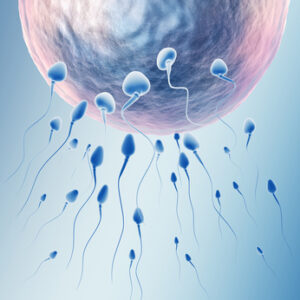
Long Covid Advocacy Ireland – Gut Health Webinar
April 14, 2025
ApoB and heart health
April 23, 2025
If you are having fertility issues, a semen analysis for the male is the standard test. This tests for the number of sperm and how they are moving (swimming) and whether they appear to be normal and healthy. However, inside the sperm is contained the paternal DNA to be delivered to the egg. If this DNA is damaged, this will reduce the chances of healthy embryo formation and ultimately a successful pregnancy. Studies have shown that high levels of DNA fragmentation can cause an increased risk of infertility, failed IVF and the possibility of recurrent miscarriage1.
Up to 25% of men with a completely normal semen analysis may have increased sperm DNA fragmentation so we highly recommend including this analysis from the very first investigation – DNA Fragmentation Test. A DNA Fragmentation Index (DFI) of <15% is optimal for fertility and conception, 15-30% is moderate risk and >30% is high risk.
Reducing high DNA fragmentation is a two-pronged approach. On one hand it is essential to try to identify and reduce the underlying causes, which is mostly a source of increased oxidative stress which damages DNA. In addition, it is important to replenish protective antioxidants that can protect the sperm from damage.
Sources of oxidative stress
- Infection – inflammation can cause a significant increase in oxidative stress
- Varicocele – similar to a varicose vein near the testes, can increase damage to sperm, (requires surgical procedure)
- Obesity – excess body fat, especially that which accumulates around the middle
- Smoking – markedly increases oxidative stress and depletes antioxidants
- Testicular heat – radiation, increased local heat can damage sperm and sperm DNA
- Chemicals – exposure to certain pesticides and other chemicals
- Poor diet – a diet low in protective antioxidants, deficiencies in vitamins or minerals
- Age – DNA fragmentation may increase with age
- Genetics – issues with the folate cycle, iron overload and others
- Some conditions such as undiagnosed or poorly managed type II diabetes
- Some medications
Can nutrition help?
Sperm DNA fragmentation responds extremely well to nutritional therapy and lifestyle changes. We have written a paper on this topic, you can read our published paper here.
What are the key nutrients?
Antioxidants such as zinc are particularly important for male fertility. Food sources include meat, sea food, fish, eggs and also beans, nuts and seeds, wholegrains and dairy products.
Selenium isfound in high concentration in the testes. It is part of the antioxidant glutathione peroxidases (GPX), which protect sperm 2. Brazil nuts are a great source of selenium, it can also be found in meat, chicken, fish, shellfish and eggs. Just one Brazil nut per day is enough, excess can be unhelpful. Selenium levels depend on soil content. Supplementing is ineffective and potentially harmful if levels are already adequate. It’s best to check your levels before you supplement.
Vitamins C and E are both important antioxidants for sperm health. They work together as vitamin C is water soluble and vitamin E is fat soluble. Vitamin C may be particularly important if you smoke.
Clinical trials have shown success in reducing DNA fragmentation with both vitamin C and E 2. A diet rich in fruits, vegetables, nuts, seeds and healthy fats such as avocado, salmon and olives should provide sufficient vitamin C and E for general health. High levels of supplementation can also be detrimental though.
Other important nutrients
Omega 3 protects the sperm and integral for membrane integrity. One study showed that supplementation with docosahexaenoic acid (DHA) not only improved antioxidant capacity but reduced DNA fragmentation and overall semen quality 3. The best source is oily fish include salmon, mackerel, sardines and anchovies. To get enough omega 3 you would need to be eating oily fish 2 or 3 times per week. If you don’t eat fish, then you can get some omega 3 in ground linseeds (flax seeds), pumpkin, hemp and chia seeds and walnuts. However, you only covert a small amount into the usable forms of omega 3 and may not be getting enough. In this case supplementation may be helpful.
Vitamin D
Conception rates rise in summer, suggesting a role for vitamin D, as sperm have vitamin D receptors. Supplement with caution—excess can be toxic and harm the immune system. In winter, around 50% of Irish adults may be deficient, but over-supplementation is also common. A 1000IU dose suits most but varies by individual needs. Having your levels checked is recommended.
Medicinal Mushrooms
Medicinal mushrooms support immune function and help reduce inflammation, which can harm sperm. Some aid with sperm antibodies, but others, like reishi, may lower testosterone. It is important to use these supplements under a nutritionist’s guidance.
How does lifestyle play a part?
The main lifestyle factors to address in relation to reducing oxidative stress and improving DNA Fragmentation are smoking, chronic stress, radiation and exposure to pesticides/toxins
All factors will be considered to create a personalized nutrition, lifestyle, and supplement plan based on your results. Our fertility nutrient profile test can be very helpful alongside the DNA Fragmentation test to help assess your antioxidant needs.
If you would like to learn more about testing and how nutrient and lifestyle changes can be helpful for male infertility please get in touch.
References
- Haddock L et al. Sperm DNA fragmentation is a novel biomarker for early pregnancy loss, Reproductive BioMedicine Online, Volume 42, Issue 1, 2021, Pages 175-184. https://doi.org/10.1016/j.rbmo.2020.09.016.
- Wright C et al. Sperm DNA damage caused by oxidative stress: modifiable clinical, lifestyle and nutritional factors in male infertility. Reprod Biomed Online. 2014 Jun;28(6):684-703 http://dx.doi.org/10.1016/j.rbmo.2014.02.004
- Martínez-Soto JC et al. Dietary supplementation with docosahexaenoic acid (DHA) improves seminal antioxidant status and decreases sperm DNA fragmentation. Systems Biology in Reproductive Medicine, 2016: 62(6), 387–395. https://doi.org/10.1080/19396368.2016.1246623


